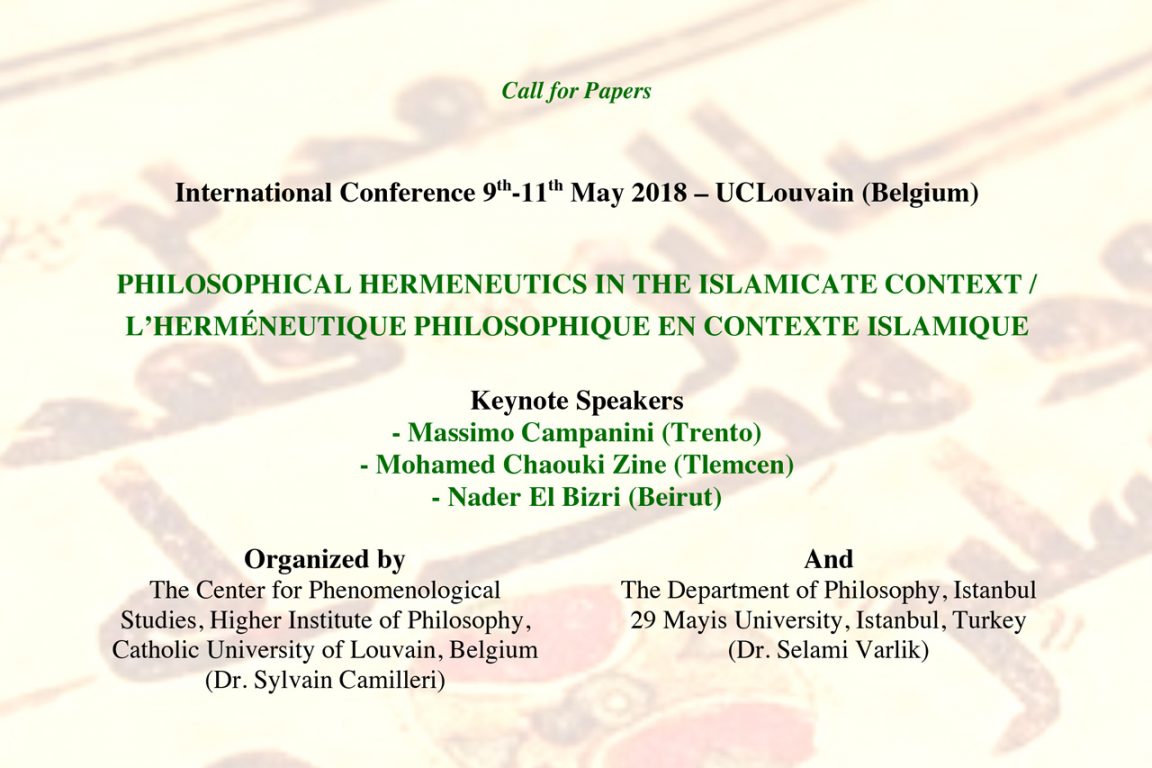Philosophical Hermeneutics in the Islamicate Context

About The Event
Call for Papers
Date: May 9-11, 2018
Venue: UCLouvain, Louvain-la-Neuve, Belgium
Abstract Submission Deadline: January 1, 2018
The Center for Phenomenological Studies (CEP), together with the Department of Philosophy of the Istanbul 29 Mayis University and the Institute for Islamic Sciences and Modern Oriental Philology of the University of Bern, organizes an important conference in May 2018 on the following topic: « Philosophical Hermeneutics in the Islamicate Context/L’herméneutique philosophique en contexte islamique ». This meeting will take place at UCLouvain, Louvain-la-Neuve, Belgium.
Philosophical hermeneutics originally stems from a religious tradition that goes back to the interpretation of sacred texts in Antiquity and has undergone many (r)evolutions through the centuries. Since modern times it has emancipated from its religious sources to become an autonomous discipline with its own conceptual apparatus and its various strands. This discipline has become the backbone of contemporary continental philosophy.
If hermeneutics in itself has never been an exclusivity of the West, the inception of philosophical hermeneutics has shown to be closely linked to the historical and philosophical development of Europe and later of the Americas: let us remember the Enlightenment period and the struggle to overcome the intellectual narrow mindedness of certain Christian dogmas, the end of the 19th century attempt to counter the drastic effects of the breakthrough of natural sciences on the very activity of reflecting spiritual life, or the 20th century endeavor to recover the true meaning of individual existence within an age of globalization…
This conference would like to engage with one specific context among all those which were and still are, as it were, “affected” by philosophical hermeneutics: the Islamicate context. The Islamicate context seems to be particularly relevant for three reasons at least:
1) The Islamicate context is intertwined with the Western context in a way that calls for asking whether the application or the import of philosophical hermeneutics in general does or does not require a minimum of shared history, and whether one should speak – in the particular Islamicate context – either of a cultural or a conceptual transfer only?
2) The Islamicate context retains a clear and sound reference to religion that makes its entanglement with philosophical hermeneutics a burning challenge for all parties involved. Is it true, as some contend since several decades, that philosophical hermeneutics can help interpreting Islamic thought anew?
3) The Islamicate context and the Western context are not just intertwined, but they are also penetrating each other. How does philosophical hermeneutics contribute to their mutual understanding?
These are few of the many questions that this conference will try to address, with the general aim to establish whether and how philosophical hermeneutics and Islamicate thought are likely to expand each other’s horizons and/or to influence each other’s conceptual frameworks.
In more concrete terms the universality of the hermeneutic order should be put to the test of the Islamicate context within three different panels:
1. Interpretative Dimensions: this panel will address contemporary thinkers from the Islamicate world who have engaged critically or not with main representatives or key concepts of philosophical hermeneutics.
2. Comparative Dimensions: this panel will deal with possible dialogues and transactions on the basis of common traits, similarities, differences and divergences – of epistemological, ontological or even existential order – between the methodologies of philosophical hermeneutics on the one hand and of Islamicate interpretative patterns such as tafsīr/taʾwīl and others on the other hand.
3. Creative dimensions: this panel will present attempts at using philosophical hermeneutics in order to develop new interpretations of canonical or traditional ensembles of texts such as the Qur’an and the Hadith as well as legal, spiritual and philosophical corpuses from the Islamicate world (while keeping in mind the essential connection between these textual ensembles and individual as well as collective lived-experiences).
Proposals falling under more than one of the aforementioned panels are also welcome.
Keynote Speakers
- Massimo Campanini, University of Trento
- Nader El-Bizri, American University of Beirut
- Mohammed Chaouki Zine, University of Tlemcen
Topic areas
- 19th Century Philosophy
- 20th Century Philosophy
- Metaphysics
- Philosophy of Religion
- Continental Philosophy
- European Philosophy
Please send an abstract of ca. 500 words to sylvain.camilleri@uclouvain.be and svarlik@29mayis.edu.tr before January 1st 2018. Acceptance or refusal will be notified by January 10th 2018.
Organizers
- Sylvain Camilleri, Catholic University of Louvain
- Selami Varlik, Istanbul 29 Mayis University
More information at: Centre d’études phénoménologiques (CEP)


We're always eager to hear from you.
If you’d like to learn more about us or have a general comments and suggestions about the site, email us at